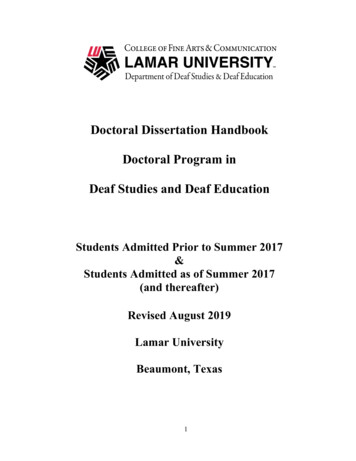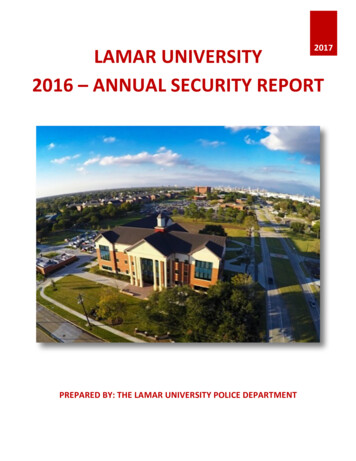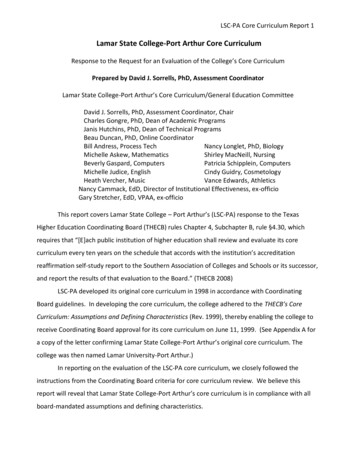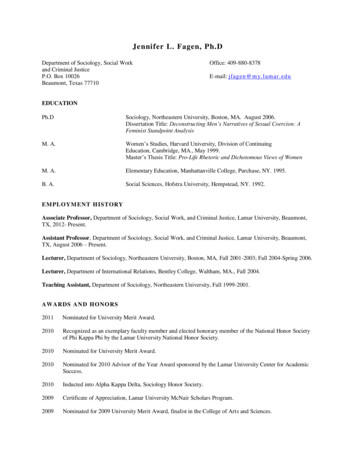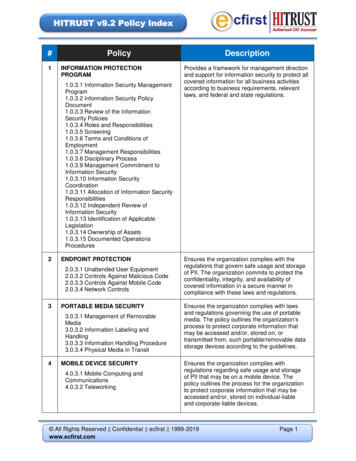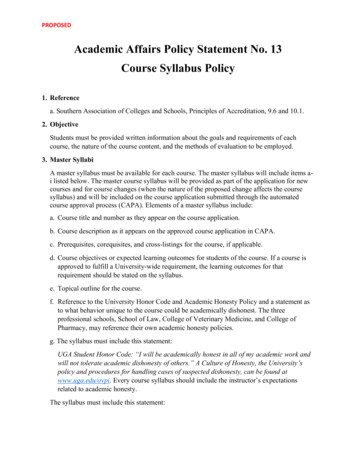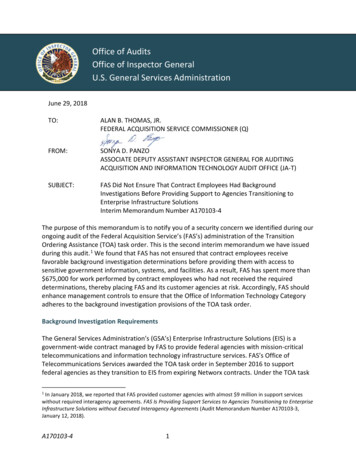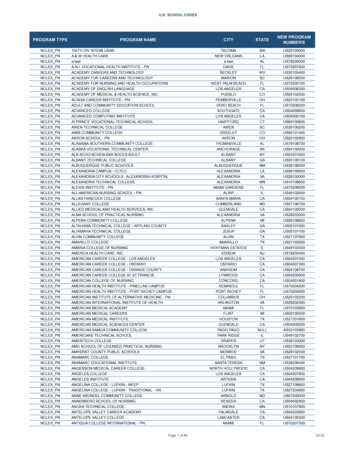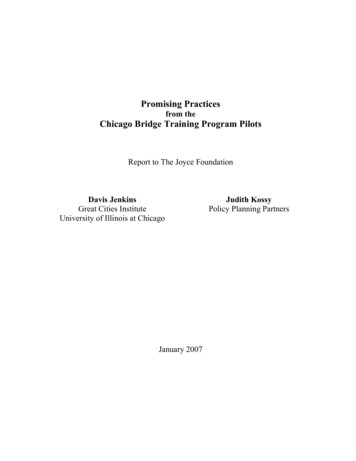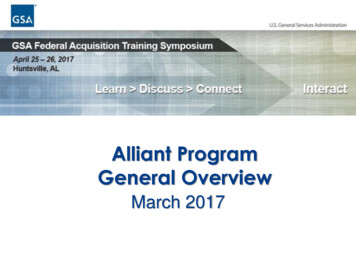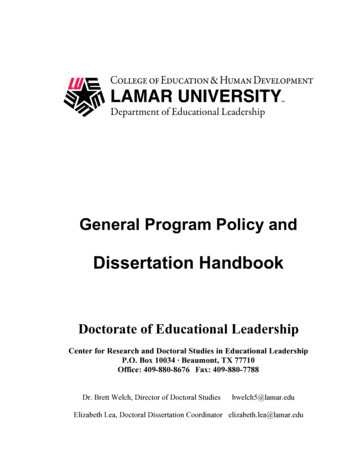
Transcription
General Program Policy andDissertation HandbookDoctorate of Educational LeadershipCenter for Research and Doctoral Studies in Educational LeadershipP.O. Box 10034 · Beaumont, TX 77710Office: 409-880-8676 Fax: 409-880-7788Dr. Brett Welch, Director of Doctoral Studiesbwelch5@lamar.eduElizabeth Lea, Doctoral Dissertation Coordinator elizabeth.lea@lamar.edu
Table of ContentsPart I: General Program Policy Handbook. 7Program Objectives . 7Guiding Principles for Faculty. 8Program Administration . 8Program Delivery Method . 8Admission Requirements for the Program . 8Program Description . 9Degree Plan. 9Ed.D. Program Requirements . 9Transfer Credit . 10Incomplete Grades . 10Notification of Failing Grades . 10Graduate College Policies . 10Academic Probation and Suspension . 10Minimum Academic Performance. . 10Probation. 11Suspension. . 11Academic Honesty . 11Forms of Academic Dishonesty . 11Procedures. 12Appeals Process . 13Participation Policy . 13Residency Requirements . 13Application for Candidacy . 13Advancement to Candidacy . 13Continuous Enrollment Requirement. 13Institutional Review Board . 14Synthesis and Dissertation Grades . 14Graduation . 14Dissertation . 14Final Dissertation Defense . 15Submission of the Dissertation and Abstract. 15Adherence to Timeline . 15Financial Aid Funding. 15Attendance at SERA and Other Research Conferences . 15Employment at Institution Granting Doctoral Degrees . 15Part II – Dissertation Guide . 17Dissertation General Information . 17Issues of Scholarship . 17Responsibility . 17Scholarly Conduct . 17
Acknowledgement of Sources . 17Copyright . 18Paid and Unpaid Assistance . 18The Dissertation Process . 19Dissertation Chair . 19Dissertation Committee . 19EDUD 6353 – Synthesis and Application for Candidacy (D4a) . 20Portfolio . 20Prospectus . 20Application for Candidacy . 21Dissertation Proposal . 21After successful Defense - Advancement to . 22Institutional Review Board and IRB Application Process . 23Dissertation Defense . 23Protocol for students and committee members for dissertation defense. . 23Dissertation Defense Meeting . 24Letter Grades for the Dissertation. . 25Office of Graduate Studies and Graduation Deadlines . 25Submission of the Dissertation . 25Preparation of Final Manuscript . 25Parts of the Dissertation . 27Research Dissertations . 27Non-Traditional Styles of Dissertations . 27Thematic Cluster Dissertations or Team Projects . 28Problems of practice . 29Traditional Styles of Dissertations . 30Chapter I [Qualitative] . 31Chapter II [Qualitative] . 33Chapter III [Qualitative]. 34Guided Protocol Example . 36Chapter I [Quantitative] . 38Chapter II [Quantitative] . 40Chapter III [Quantitative] . 41General Guidelines for Chapters IV and V for All Types of Dissertations . 43Chapter IV . 44Chapter V . 45Appendix . 48Appendix A - Sample Pages . 49Sample TITLE PAGE . 50Sample Signature Page. 51
Sample Copyright Page . 52Sample Abstract . 53Sample ACKNOWLEDGEMENTS . 54Sample List of Figures . 57Sample Biographical Note. 58Appendix B - Sample Doctoral Forms. 59APPOINTMENT OF DOCTORAL DISSERTATION COMMITTEE . 60APPLICATION FOR ADVANCEMENT TO CANDIDACY . 61DISSERTATION PROPOSAL DEFENSE REPORT FORM . 62PROPOSAL TITLE: Click here to enter title of proposal. . 62ADVANCEMENT TO CANDIDACY CERTIFICATE OF APPROVAL . 63SCHEDULE for DOCTORAL DISSERTATION ORAL DEFENSE . 64Transfer Credit. 65DOCTORAL DISSERTATION DEFENSE REPORT FORM . 66DOCTORAL DISSERTATION APPROVAL. 67REQUEST TO CHANGE DOCTORAL COURSE PROGRAM/COMMITTEE . 68Sample Letter: INVITATION TO PARTICIPATION IN STUDY . 69Sample Letter: SUBJECT CONSENT TO PARTICIPATION IN RESEARCH. 70Checklist for Dissertation Content. 71Checklist for Dissertation Formatting . 75Questions Typically Asked at Dissertation Defense. 77Dissertation Help: Three Easy Steps for Writing Good Paragraphs. 78Checklist for the Dissertation Process . 85Examples of APA References 6th ed. Guidelines . 86Dissertation Submission Process Instructions . 94
PART I GENERAL PROGRAMPOLICY HANDBOOKThe purpose of the General Program Policy and Dissertation Handbook is to serve as a guide forstudents and faculty. As the program develops, revisions and additions will be considered as needed.6
Part I: General Program Policy HandbookLamar University is a comprehensive Carnegie public institution whose mission is to engage andempower students with the skills and knowledge to thrive in their personal lives and chosen fields ofendeavor. As a doctoral granting, non-profit institution accredited by the Southern Association ofColleges and Schools, Lamar University is internationally recognized for its high-quality academics,innovative curriculum, diverse student population, accessibility, and leading edge scholarly activitiesdedicated to transforming the communities of Southeast Texas and beyond.Lamar University offers five doctoral degrees: audiology, engineering, chemical engineering, deafeducation, and educational leadership. The doctoral degree in Educational Leadership (Ed.D.) is in theCollege of Education and Human Development. The goal of the doctoral program in EducationalLeadership is to prepare leaders with leadership competencies that can effectively lead in thischanging global society and are able to work successfully in a diverse, multi-national environment.Graduates are prepared for roles as leaders in schools, colleges, universities, health and humanservices agencies, and a variety of other public and private educational settings.Under the College of Education and Human Development, since 2004, the Lamar Ed.D. inEducational Leadership has prepared educators for advanced professional responsibility, leadership,and accountability in diverse school and learning communities, in both P-12 and higher education.Because of our rapidly changing world that continues to evolve into a global community and emergingmarkets, leaders must be able to work in a diverse, multi-national environment whether it be corporate,non-profit, or education. In addition, as technology continues to provide increased globalization andpreviously defined boundaries are disappearing, leaders are faced with new challenges within thisquickly changing environment. Whether in education or business, leaders must quickly adapt toworking cross-culturally, understanding cultural differences, and embracing a new global perspective.Moreover, “with the rise of globalization, so rises the need for leaders with global perspective andintercultural competence to meet these growing challenges and opportunities” (Irving, 2009, p. 3).These competencies are not always linked to traditional leadership theory; in fact, Perkins (2009)argued that today’s global leaders could not be effectively trained through typical leadership theoryand research courses.Program ObjectivesOur doctoral students are educators who want to be effective leaders in diverse settings where theprimary emphasis is on student learning and quality teaching. Students in the program engage in fieldbased research with schools or other organizations. Through reflective practices and questioningstrategies, doctoral students create course projects and create relationships to develop the leadershipcapacity of educational communities and enable them to sustain promising reforms.The Ed.D. program objectives are for graduates to:§ demonstrate competence in finding, critiquing, and applying empirical research evidence tolocal or global educational problems/issues and communicating it to both scholars andpractitioners.§ demonstrate competence in conducting research that contributes to educational knowledgeabout issues in local or global contexts. Could include program evaluation or traditionalquantitative or qualitative research.§ translate educational theory to practice as a scholar/practitioner.§ enhance personal and professional growth that is demonstrated via transformative experiences.§ engage in a process of critical self-reflection and self-examination in which they must closelyexamine their assumptions and beliefs about global educational leadership.7
§analyze and evaluate global educational leadership issues by incorporating innovative andcreative solutions to current and future educational problems.Guiding Principles for FacultyDoctoral faculty will always:§ Support a curriculum that is relevant and based on research, standards, and best practice;§ Keep students and their success as our highest priority;§ Be committed to continuous personal development;§ Maintain integrity as a foundation for all our actions and decisions;§ Build and support networks of educational leaders;§ Evidence the same kind of behavior that we expect from students including functioning as acollaborative team;§ Listen to the needs of practicing leaders in the communities we serve;§ Encourage the use of technology to extend learning;§ Promote the creation of a work environment that builds in team activities and focuses onproject development; and§ Provide effective support leading to the completion of a quality dissertation.Program AdministrationThe Dean of the College of Graduate Studies oversees the doctoral program and has final approval of
Lamar University offers five doctoral degrees: audiology, engineering, chemical engineering, deaf education, and educational leadership. The doctoral degree in Educational Leadership (Ed.D.) is in the College of Education and Human Development. The goal of the doctoral program in Educational
